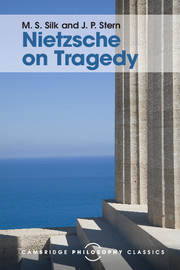Book contents
- Frontmatter
- Dedication
- Epigraph
- Contents
- Preface to this edition
- Preface
- Note
- 1 Germany and Greece
- 2 Biographical background I: Nietzsche and his early interests
- 3 Biographical background II: the genesis of The Birth of Tragedy
- 4 The argument of The Birth of Tragedy
- 5 The aftermath
- 6 Nietzsche's account of Greece
- 7 Mode and originality
- 8 Tragedy, music and aesthetics
- 9 Nietzsche and earlier German theories of tragedy
- 10 Style and philosophy
- Bibliography
- Index
4 - The argument of The Birth of Tragedy
Published online by Cambridge University Press: 05 August 2016
- Frontmatter
- Dedication
- Epigraph
- Contents
- Preface to this edition
- Preface
- Note
- 1 Germany and Greece
- 2 Biographical background I: Nietzsche and his early interests
- 3 Biographical background II: the genesis of The Birth of Tragedy
- 4 The argument of The Birth of Tragedy
- 5 The aftermath
- 6 Nietzsche's account of Greece
- 7 Mode and originality
- 8 Tragedy, music and aesthetics
- 9 Nietzsche and earlier German theories of tragedy
- 10 Style and philosophy
- Bibliography
- Index
Summary
The argument of BT is large, complicated, allusive and often elusive as well. In this chapter we provide a detailed summary as a practical aid, to help the reader to see precisely what Nietzsche is saying. The summary follows its original uniformly, section by section (§§), except in the following ways: (i) Nietzsche frequently alludes, without explaining the allusions, to more or less well-known features of Greek tragedy or the Greek world; he gives virtually no dates for artists, thinkers, or events, ancient or modern; and he sometimes makes points that rest, clearly enough, on unstated presuppositions, but points that cannot readily be summarized without reconstructing each presupposition and making it fully explicit. In all these cases we have supplied explanatory or factual material within square brackets: [] We have also supplied headings and subheadings (Nietzsche provides none), likewise within square brackets. (ii) Nietzsche sometimes alludes to a topic without explanation in one section, but adds the necessary explanatory matter in another (or in more than one other). In such cases, we have transposed the explanatory matter out of its proper section to the main discussion that presupposes it, but have enclosed it inside pointed brackets: < >. We have then indicated in the margin ad loc. from which section or sections such matter actually derives, using the symbol <, so that (e.g.) ‘<§10’ means ‘this matter comes from §10’. (iii) Where necessary, we have provided footnotes, containing explanatory editorial comments. However, editorial additions of all kinds are kept to a minimum. In particular, it is not our business in this chapter to pass judgements on Nietzsche's suppositions, arguments or conclusions. (iv) In many sections, Nietzsche's points are not presented in what one might take to be their natural order. Within sections, therefore, we have reordered his material, without warning, in the interests of the argument. (v) All unattributed quotations are from BT, but in this chapter and thereafter all quotations from the book follow the standard (1874) text.
Preface to Richard Wagner The aesthetic problem considered in this book is central to the hopes for Germany today.
- Type
- Chapter
- Information
- Nietzsche on Tragedy , pp. 79 - 107Publisher: Cambridge University PressPrint publication year: 2016
- 1
- Cited by



